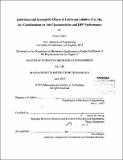Individual and synergistic effects of lubricant additive (Ca, Mg, Zn) combinations on ash characteristics and DPF performance
Author(s)
Chiou, Casey (Casey Jianzhi)
DownloadFull printable version (16.48Mb)
Alternative title
Individual and synergistic effects of lubricant additive (Ca, Mg, Zn) combinations on ash characteristics and diesel particulate filters performance
Other Contributors
Massachusetts Institute of Technology. Department of Mechanical Engineering.
Advisor
Victor W. Wong.
Terms of use
Metadata
Show full item recordAbstract
Diesel particulate filters (DPF) are devices that trap hazardous particulate matter from diesel engine exhaust in order to meet increasingly strict particle emissions regulations. Diesel exhaust particulates mainly include soot and ash. Soot, carbon particles derived from incomplete fuel combustion, can be oxidized into carbon dioxide after being trapped by the DPF through a catalytic heating process called regeneration. Ash, however, derived from metallic additives in the engine lubricant required for robust engine operation, is an incombustible material and remains within the DPF following regeneration. As ash accumulates over time, exhaust airflow through the filter becomes restricted and an engine backpressure results. Engine performance and fuel economy are reduced, requiring the DPF to be cleaned or replaced. While the detrimental effects of ash on DPF performance and therefore fuel economy can be illustrated and quantified, there is much to be understood about the specific factors that govern ash properties like distribution, permeability, and morphology. Several different parameters, such as engine operating conditions and DPF design, have been found to significantly impact ash characteristics, and the ultimate goal is to be able to control these parameters to reduce detrimental ash effects to a minimum and improve DPF service life and performance. This work addresses the source of ash directly and investigates the effect of lubricant additive chemistry on ash characteristics and DPF performance. Three lubricant formulations, that differ only in the type of additives present, are tested and compared using a controlled, accelerated DPF loading system. Filter pressure drop response and resulting ash property data collected using an array of experimental and analytical techniques show that very little difference exists between the tested oils of differing additive content.
Description
Thesis (S.M.)--Massachusetts Institute of Technology, Dept. of Mechanical Engineering, 2013. Cataloged from PDF version of thesis. Includes bibliographical references (p. 93-95).
Date issued
2013Department
Massachusetts Institute of Technology. Department of Mechanical EngineeringPublisher
Massachusetts Institute of Technology
Keywords
Mechanical Engineering.